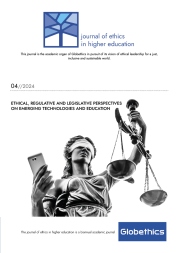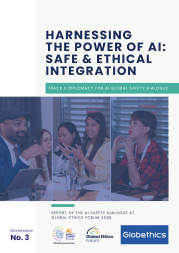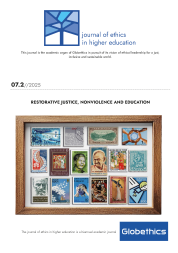Journal of Ethics in Higher Education - Issue 4(2024)
Abstract
Ethical considerations in emerging technologies for education entails clear options on at least four different sets of concepts. Emerging technologies, such as artificial intelligence (AI) are transforming the landscape of education. However, their adoption raises ethical questions. One challenge lies probably in obtaining informed consent from students in the changing environment of the places where they study, in close interaction with AI technological innovations.
There are regulations and legal perspectives that both bring solutions but also challenges.
Education and science, as distinct from technology, may need to be redefined from a philosophical perspective.
Technologies of information open a new dimension on regulatory and legal aspects in relation to bringing more justice on a global scale. Technology and science are two distinct fields, entailing a set of different disciplines. These days, public media give us the impression that supercomputers, which are used to analyse tens of millions of risk scenarios, will solve most of our concrete risks, but is it always useful to use the computing power of a computer to maximise societal stability and prevent concrete harms?
Before we think about regulating emerging technologies, we might need to think about what our problems require, often there will be a delicate balance, between knowing the reality of the problem, before we think of the solution, and before we check if we have mastered some physical reality-based application of our problem-solving thinking. On the one hand, rapid technological advancements exist, on the other scientific use of intelligence in solving concrete problems which is not only a matter of technology, is rather often related to defining the right pragmatic use of sciences. For example, the question of the predictability of risks has always been a complex issue, and technologies in the past as today, posed challenges as much as they brought possible solutions. There are many situations, where we can describe a set of phenomena, but cannot predict, like tossing a coin in the air and trying to guess which way it will land.
As many contributions to Issue 4(2024) are coming from:
-Stadio Education: "Technology Enabling Curriculum Transformation",
-Globethics: "ICDE Leadership Summit 2024",
The Board of Editors of JEHE express their gratitude for the kind authorisation to publish by the authors and by the institutions.
Journal of Ethics in Higher Education
The focus and scope of the Journal of Ethics in Higher Education (JEHE) is to provide a space on the Globethics platform for the publication of research results in a scientific journal.



